“Human influence on the climate system is clear” was the key message from the report on the physical science of climate change from the Intergovernmental Panel on Climate Change (IPCC).
“We have come a long way since the first IPCC report was published in 1990,” a statement reiterated throughout the press conference for the release of the report. The IPCC were keen to register the significance of the work and progress made in this report – an “assessment of a string of assessments from 1990,” according to Thomas Stocker, Co-Chair for Working Group I, reporting on the physical science basis of climate change. The fourth IPCC assessment published in 2007 was the first report to state that “warming of the climate system is unequivocal” and that “most of the observed increase in global average temperatures since the mid-20th century is very likely due to the observed increase in anthropogenic greenhouse gas concentrations.”
In the fifth report, this message is heightened. Since the 1950’s many of the changes observed and analysed in this report have been unprecedented including warming of the atmosphere and ocean, diminishing amounts of snow and ice, rising sea levels, and increases in the concentrations of greenhouse gases. With 259 lead authors citing 9200 papers in the report, two thirds of which have been published since 2007, the fifth assessment presents a strong message to policymakers across the world. Incredibly, this feat of scientific work has been approved and agreed upon by 110 governments across the world, with 1089 reviewers consisting of scientists, the public and governments from 55 of those countries offering a staggering 54,677 comments on the physical science basis report. Almost every word was commented on, disputed and discussed to come up with 18 headline messages – a first for the IPCC reports – that stated in simple language the report’s key outcomes.
“If you look at temperature, it is red” stated Stocker in a press conference, describing one of several key images from the IPCC policymaker summary.
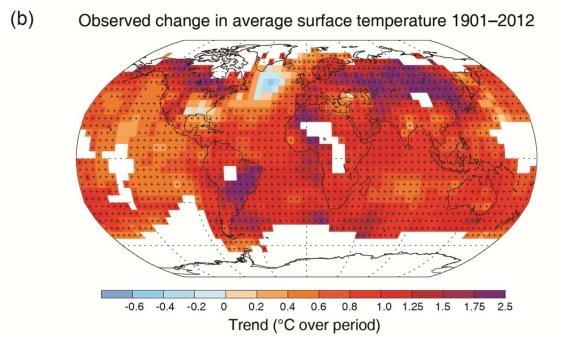
Observed change in average surface temperature 1901-2012 from IPCC Working Group I summary for policymakers (SPM 28).
This simple statement with clever wordplay not only elicits a global increase in surface temperature but also danger. Our planet is warming, and humans are the culprit. He goes on to say “…each of the last three decades has been successively warmer at the Earth’s surface than any preceding decade since 1850…Global surface temperature change for the end of the 21st century is likely to exceed 1.5°C relative to 1850 to 1900 for all RCP scenarios.” RCP stands for representative concentration pathways, four greenhouse gas concentration trajectory models used by the IPCC in its fifth report.
“In the Northern Hemisphere, 1983–2012 was likely the warmest 30-year period of the last 1400 years.” For the fifth assessment the IPCC have gone to great lengths not only to ensure consistency and reliability in scientific data and consensus, but also to outline the key points from their summary for policymakers: the use of simple language to describe the data that does not include hype or headlines but instead simple scientific language.
The report also highlights the increase in global mean sea level rise, with a key headline stating “…the rate of sea level rise since the mid-19th century has been larger than the mean rate during the previous two millennia (high confidence). Over the period 1901–2010, global mean sea level rose by 0.19 [0.17 to 0.21] m”.

Global mean sea level rise from IPCC Working Group I summary for policymakers (SPM 35).
In each of the IPCC’s four RCPs it was clear that the higher the cumulative carbon emissions, the warmer it gets.
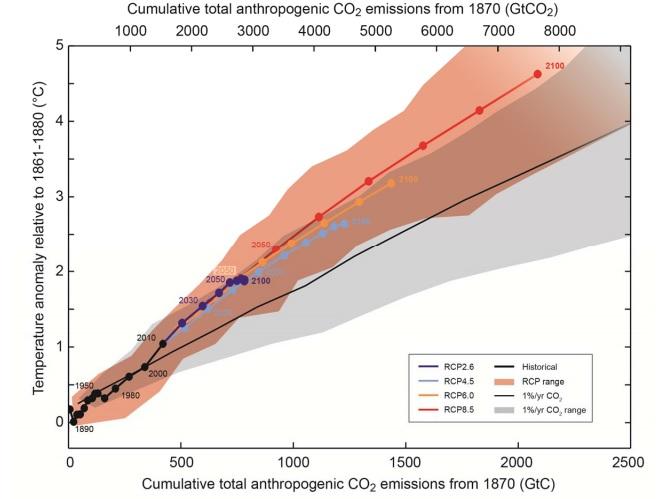
Cumulative total anthropogenic CO2 emissions from 1870 (GtCO2 ) from IPCC Working Group I summary for policymakers (SPM 36).
The summary for policymakers states “…cumulative emissions of CO2 largely determine global mean surface warming by the late 21st century and beyond”, (above), “Most aspects of climate change will persist for many centuries even if emissions of CO2 are stopped. This represents a substantial multi-century climate change commitment created by past, present and future emissions of CO2.”
Dominique Raynaud, review editor of chapter five (on palaeoclimatology) of the report and officer on the EGU Climate: Past, Present and Future Division in an interview with the EGU Educational Fellow commented on the most important aspect of this report: “For the first time the scientific community has defined a set of 4 [RCP] scenarios which represent a range of 21st century climate policies. Only one scenario suggests that the global mean temperature change for the end of the 21st century will not exceed 2°C.”
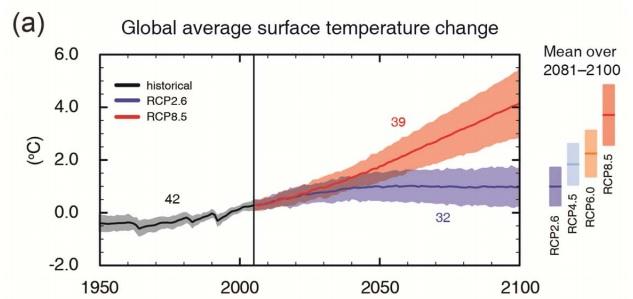
Global average surface temperature change estimated from present to 2100 (°C), from IPCC Working Group I summary for policymakers (SPM 33).
Raynaud went on to say “With this scenario, we still have a hope to keep [to the] reasonable expected warming for this century…policymakers should obviously consider such a possibly.”
In some ways, the outcomes of this report are a repetition of what the public have already been hearing: humans are influencing climate change. But what is crucial to note about this 5th assessment report is the huge consensus among scientists, public and governments about this statement.
“This is not about ideology, this is not about self-interest” was a quote from Achim Steiner, the head of the UN’s environment programme, UNEP – a comment that will resonate with many through the ‘unequivocal’ status of the report’s conclusions – and a statement that Stocker echoed later “it threatens our planet, our only home,” clearly urging policymakers across the globe to take combined action on climate change.
By Jane Robb, EGU Educational Fellow
References:
IPCC Working Group I session report for 5th Assessment Report (summary for policymakers)

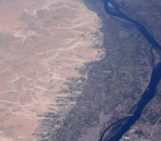

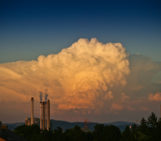
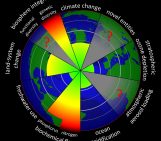
Pingback: The new EGU blog series on Education: GeoEd | GeoLog